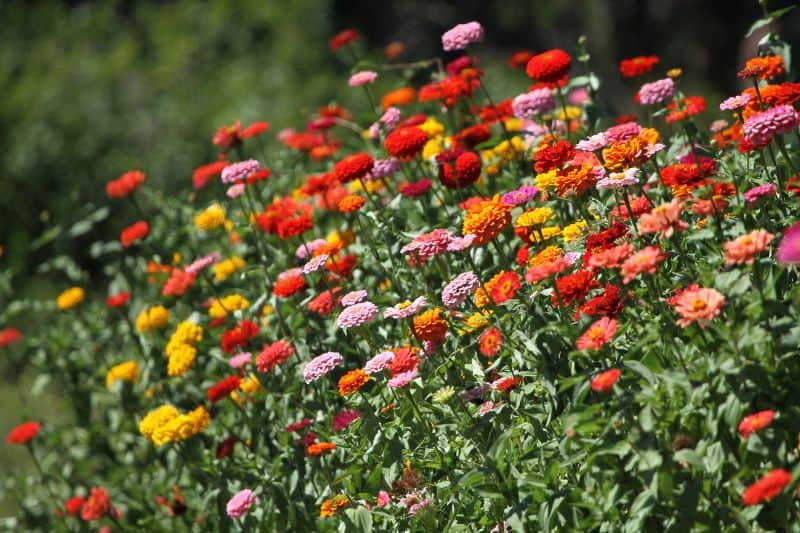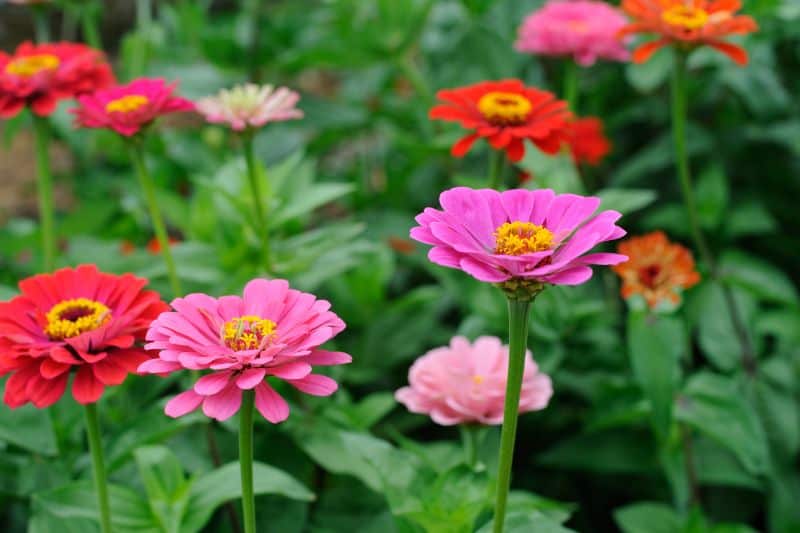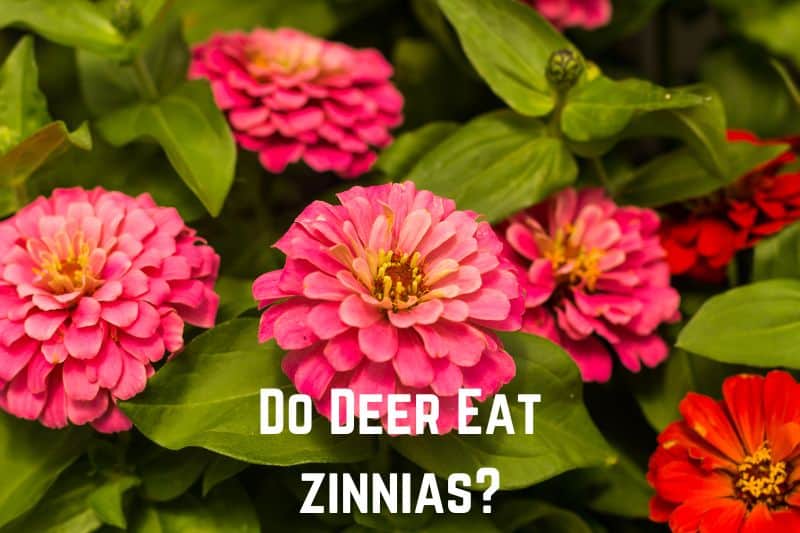The prolific and brightly colored blossoms that zinnias produce instantly enlighten any outdoor space. In fact, these beautiful and popular garden annuals are among the best for attracting pollinators, like butterflies and equally beautiful birds. But, for many zinnia lovers, the question always remains – do deer eat zinnias?
These large land-dwelling animals can cause devastating damage to a heap of plants in the garden. So, having beautiful blossoms, like zinnias only to end up being munched down by deer isn’t the most exciting thing.
This brief will help you figure out if these elegant blossoms are susceptible to deer – and what measures to take for their protection.
Read: Do Deer Eat Pansies? (Yes. They Do)
Are Zinnias Deer Resistant?
Zinnias are deer-resistant. These annuals don’t taste good to deer, so they tend to deviate away from them. But, this doesn’t mean that zinnias are dangerous or poisonous. Planted in the garden, zinnias are safe for humans, including children, dogs, cats, and horses.
This incredible resistance to deer makes zinnias ideal plants for areas with dense deer populations. However, it’s worth noting that zinnias are deer resistant but not deer deterrent. So, while deers will not eat zinnias, it doesn’t mean they don’t get near these plants.
Moreover, you can’t use zinnias to deter deer from your garden. To prevent deer from coming near zinnias, you have to complement them with deer-deterrent plants. Alternatively, you can implement other deer-deterrent measures to supplement them.
Do Deer Eat Zinnia Flowers?
Deer typically avoids plants with particularly bright colors, sharp tastes, strong scents, and strange textures. This is because these characteristics are usually indicators of toxicity in plants.
So, even if the actual plant is not poisonous or toxic to animals, deer will avoid them to be on the safe side. Deer also prefer more tender plants instead of hardy plants, like zinnias.
Deer do not eat zinnia flowers as they don’t like their taste or smell. Moreover, zinnia flowers tend to have prickly centers that are opposite to the tender textures deer love. Zinnias also produce pretty bright flowers, which naturally repel deer. However, deer may eat flowers and other parts of the zinnia plant in special circumstances when they really need to.
In these circumstances, deer will eat the much tender zinnia buds, although flowers are equally unsafe at this time. There are two common reasons why deers may resort to eating zinnias. The first reason is due to food shortages.
During winter time, food may sometimes be scarce. So, deer will eat whatever they can find. As a result, deers may end up feeding on buds or blooming zinnias. But, zinnias will still not eat as much zinnias due to their prickly centers. So, you don’t have to worry about massive damage to your zinnias – for the most part.
Drought is another reason why deer may feed on zinnias. With a lack of food and water, deers don’t exactly have the luxury to be picky eaters. In the modern world, growing problems, like global warming continue to transform climate and even natural food availability.
This means that deer are increasingly at risk of facing food scarcity. This may lead to these animals feeding more on undesirable plants, like zinnias.

Do Deer Eat Zinnias Leaves?
Deers do not eat zinnia leaves. This is because zinnia leaves feature an undesirable texture with hairy dark green foliage and prominent veins. This, in turn, makes the leaves inedible for the deer.
Like their flowers, zinnia leaves don’t taste too good for deer. While they may taste the leaves, deer will not completely eat them.
Will Zinnias Regrow After Deer Eat Them?
If deer eat zinnias, they may or may not regrow. But, their failure to grow has nothing to do with deer. Zinnias are annual plants, so they do not regrow, like perennials. Annual plants typically die off after producing seeds after the first frost period.
Generally, as annuals, zinnias will grow, produce seeds and flowers, and then die off. So, even if deers don’t eat them, they still won’t survive past their annual season. However, there is a silver lining to deer eating part of the zinnia plants, especially flowers and leaves.
Like many annuals, zinnias benefit from deadheading. Deadheading refers to the process of pruning seed heads and old growth to promote new growth and re-flowering. Deers are completing natural deadheading by feeding on a few dying flowers and leaves.
So, deer feeding on zinnia plants can sometimes be good and promote flower regrowth. Ultimately, whether or not zinnias regrow after being eaten by deer depends on the period in the season.
Which Plants Do Deer Like To Eat The Most?
Deers prefer to feed on plant materials as they are herbivores. But, this doesn’t mean that deer will eat just about any plant. Instead, they prefer lush and tender plants with mellow scents and tastes. Deers also prefer plans without peculiar textures.
Deers tend to feed a wide range of plants, including flowers, nuts, legumes, vegetables, berries, grass, shrubs, and trees. Deers will even eat a few select tree bark. A large adult deer will eat as much as 10 to 12 pounds of food a day. As herbivores, deer need to eat a lot to provide their larger bodies with the much-needed energy and nutrition.
Here is a short list of common plants deer feed on include
- Lilies
- Roses
- Tulips
- Pecans
- Hickory nuts
- Acorns
- Peas
- Beans
- Corn
- Cabbage
- Broccoli
- Lettuce
- Apples
- Pears
- Grapes
- Plums
- Blackberries
- Blueberries
- Azaleas
- Winter grass
- Sedges
- Witchgrass

Ways to Keep Deer From Eating Zinnias
As mentioned earlier, zinnias are deer resistant but not deer deterrent. So, if you want to keep deer away from your garden, zinnias alone are not enough. You especially want to protect your garden during drought or hunger periods as deers may resort to eating these annuals.
In these cases, it’s always a good idea to plant grass that deers love so they can have something to feed on. In fact, you can even use this as a measure to keep deer away from your zinnias.
Read: Do Deer Eat Peonies?
Here are other ways to keep deer from eating zinnias;
- Deers are easily spooked by humans. So, planting zinnias in high-traffic areas, like near a frequently used exit door, is enough to keep the deer away and at a distance.
- Use chemical odor repellents you can purchase or DIY (e.g. mixture of water and rotten eggs or liquid soap). It’s a good idea to rotate odor sprays. Deers are quite resourceful animals and will adapt to these tastes over time to get to food. Rotating the odor repellents leaves them guessing each day.
- You can also use natural deterrents like human hairs. Deers are scared of humans, so scattering human hair around zinnias is enough to keep them away.
- Complement zinnias with actual deer-deterrent plants, such as aromatic herbs, toxic foxgloves, and boxwood, among others.
- Use physical barriers, like wire fences, thorny shrubs, hidden fishing lines, and even gadgets, like sprinklers and floodlights. Higher fences, like an 8-foot fence, are enough to prevent the popular deer jumps. On the other hand, only invest in gadgets if you have the budget. Gadgets like floodlights and reflective surfaces can be limiting as they are only effective at certain times. Floodlights work well at night while reflective surfaces work better during a sunny day.
- Noises are also effective at keeping deer away. But, human chatter isn’t exactly sustainable since you can’t have a group of people sitting in one place all day and every day. Instead, you can invest in noise-producing products. These include electric wires, wind chimes, whistles, and even a radio.
FAQ’s
Are Zinnias Deer Deterrent?
Zinnias are deer resistant but they are not deer-deterrent. This means that while deers do not feed on zinnias, they don’t necessarily avoid going near zinnias. Therefore, you cannot use zinnias to deter and keep away deers from your garden. If you want to use plants to keep deer out, you have to pick an actual deer-deterrent plant.
Are Zinnias Resistant to All Animals?
In general, zinnias are resistant to most animals. These include anything from rabbits to deer. Zinnias feature characteristic brightly colored flowers, prickly flower interior centers, hairy leaves, and prominent veins. Moreover, both zinnia plants and leaves have a sharp taste and scent. For animals, these are characteristics of poisonous and toxic plants.
Are Zinnias Resistant to Pests?
Zinnias are resistant to most pests. However, they can still be susceptible to infestation and damage from a few pests. These include aphids, Japanese beetles, whiteflies, and spider mites. Zinnias are even more vulnerable to these pests if they are growing in hot and dry climates. Zinnias may also be susceptible to fungal activities that cause powdery mildew, leaf spots, and fungal blooms.






